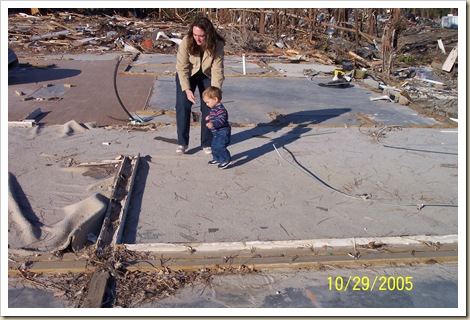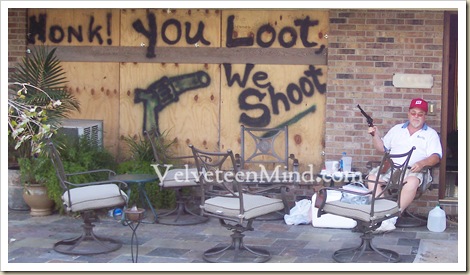{Audioblog} Download 'Hurricane Katrina Loads of Hope' read by the author
Razor wire used to lace along the length of the Mississippi Gulf Coast. Two blocks north of the beach, along the railroad tracks where the earth rises just enough to slow the rush of surging water, coils of sharp wire kept those of us north of the tracks from entering the wasteland south of the tracks. Where the debris towered. Where houses not cleaned to the slab teetered.
Where the bodies were.
It is amazing what the human psyche can grow accustomed to, given enough time and torture. Or perhaps you only allow yourself to get used to it when that time and torture is laced with razor-sharp hope. You know it will be over some day. So you keep moving. And you try not to wonder too much about what is south of the tracks.
Four years ago, I would have given anything to know what awaited me south of the tracks. Little did I know that I had nothing left to give. At least nothing that once nestled south of those tracks.
The warmly lit, thoughtfully adorned space that I called my home was reduced to a slab of concrete four years ago. Hurricane Katrina made landfall along the Mississippi Gulf Coast on August 29, 2005. We received the strongest winds of the eastern eye wall, typically the most dangerous quadrant of a hurricane. As such, the Gulf Coast was the favored spot for storm chasers.
There is not a plethora of “Al Roker hanging onto a tree” news footage of Katrina hitting Biloxi and Gulfport and Long Beach and Pass Christian and Bay St. Louis and Waveland… because a “white out” occurred. In short, the wind and rain were so strong that you couldn’t see beyond a few feet.
Then the waves came.
Unlike New Orleans where the beautiful bowl of the city, the city I had just moved away from, filled up with water and then eventually emptied, leaving ruined structures behind, the Mississippi Gulf Coast was simply wiped clean for miles and miles. Nothing to see here, folks. Just empty slabs.
I’m still not sure which was worse. I generally don’t try to tally those points.
I do remember saying, over and over, “Please God, if it’s gone, let it all be gone. Don’t leave me with a ruined home that needs to be sifted through. Just take it all.” I couldn’t bear the choices that would have to be made. The fruitless efforts to save… anything.
And so it was.
A million times over, in the days after Katrina, we heard, “I lost everything.” But so often, what they meant was that they lost everything in their attic or garage or master bedroom. Once, when pressed, I discovered that they meant everything in their refrigerator.
I can write a million times, “We lost everything.” It is only when I share the picture above that it seems to sink in.
Everything.
Everything you could touch. Save our lives.
It is impressive, isn’t it? Seeing what “everything” looks like when it’s gone.
But you could lose “everything” in a fire. What was frightening was the greater stretches that “everything” encompassed.
We lost all of our touchstones. All of our points of refuge, sources of hope. All of the things that you call “home” outside of your home.
We lost our schools. Libraries. Public utilities. Fire departments. Police stations. Hospitals. Pharmacies. Grocery stores. Restaurants. Bookstores. Piers. Bridges. Roads. Water. Sewer. Phone. Power.
We lost our freedom. It was martial law. Literally.
Dusk to dawn was a no-man’s land of curfews and military patrols. The sound of a generator in the middle of the night was a red flag. It meant you had gasoline. So few people had gasoline. So many wanted it.
Cold hard cash was bested by ice. Beer was liquid gold.
Hotlines were established to quell rumors of looting and other Carnival-of-Danger worries. Hotlines which were helpful to call… if you had a satellite phone. Otherwise, you created “watch” schedules and spray painted your house with subtle warnings.
Or not-so-subtle warnings.
That picture of my dad at my parents’ home two miles inland (yes, that’s my dad) makes me smile today. Truth be told, it made me smile when I took it. We recognized the absurdity of it, knew the hope that this would be an entertaining story one day, and simultaneously released all qualms about sitting on the front porch with a loaded gun in the middle of the day in the middle of a middle class neighborhood.
Because when you are in the middle of it, you would be amazed at that to which you can become accustomed. If you hope to come out on the other end of the storm with more than a slab of a spirit, you learn to stop fighting the surges. You learn to let hope be the rock around which you sway and bend in the wind.
Today, I drive over the railroad tracks daily as I head toward the beach to take Goose to school. I had to take an alternate route the other day and passed through an intersection that used to be a military checkpoint in the weeks after Katrina. While buildings were being secured and the debris line was being removed, that point along the coast at which the waves stopped crashing and simply pushed all of our lives into one long mass of memories, only certain people were allowed across the tracks.
Those that virtually called “bring out your dead” and those that cleaned up behind.
It reminded me of how near-complacent I became about the military presence in those days. Humvees patrolling our neighborhood. Helicopters constantly buzzing overhead. Expected and unexpected military checkpoints, depending on what was discovered under the debris that day.
How complacent we all eventually became about so much.
It was complacency that allowed us to lose so much. We had evacuated from hurricanes so many times in the weeks and months leading up to Katrina that we were worn out. Nothing ever happened and yet we spent hours packing and unpacking our lives in order to haul them hours away from a devastating storm that never came to pass.
The human spirit is resilient. But the human ego can be arrogantly defiant.
Even today, when faced with the possibility of a disastrous outcome, I find myself thinking, “Certainly I’ve filled my quota for tragedy?” It’s difficult to wrap my head around the fact that I could find myself with nothing more than three pairs of underwear to my name again. It doesn’t seem real.
Last year, I worried that our resilience was foolhardy defiance. This year, on the fourth anniversary of Hurricane Katrina, I fear that our foolhardy defiance will trick us into failing to prepare. Again.
I may, once again, find myself faced with nothing more than three unfortunately-matched outfits that can’t seem to keep themselves clean atop a body that must be washed by baby wipes because the water isn’t safe to touch. A body that sweats from the heat and bleeds from the mosquitoes.
A body that took simple comforts for granted until they are all that hold your morale from losing itself in the rubble that must surely hold something of yours, still.
Every year, I recommend to you an organization that relieves some bit of worry that is on my mind. On the second anniversary of Hurricane Katrina, it was a sense of survival granted with the help of the American Red Cross. On the third anniversary, it was the desire to rebuild without folly, made possible by Hands On Gulf Coast.
On this fourth anniversary of Hurricane Katrina, I worry about the small things that we take for granted. That, when lost, wield the power to strip us of our dignity and, stealthily, our hope.
Simple things like clean underwear. Basic human needs that hold us together.
Sometime last year, I saw an ad for Tide Loads of Hope. In the aftermath of Hurricane Katrina, Tide recognized that in times of disaster, people turn to the most basic human needs, like clean clothes. Ironically, clean clothes aren’t possible when you don’t have power or access to safe water. The little things that make all the difference when you are looking for a thread to cling to and sometime slip just beyond your grip.
Within weeks of Katrina’s landfall, Tide arrived in New Orleans with their Loads of Hope truck, a unit housing 32 energy-efficient washers and dryers capable of completing 300 loads of laundry a day, and began meeting one of those needs of residents grasping at hope.
The ad I saw mentioned that part of the support for the truck is made possible by purchasing bottles of Tide with the yellow cap. A loyal consumer of Tide already, I’d never taken the time to notice what that yellow cap meant, but now I would notice.
When I learned that Tide would be an Expo Hall vendor at the BlogHer conference in Chicago this year, where I would be speaking, I made a point to stop by their booth and thank them for the Loads of Hope program. You hear about campaigns like this and you wonder what difference they actually make. You wonder if it’s just a gimmick.
I wanted to put a face in front of them that said, “I don’t know what kind of response you are receiving, but you are making a difference when the little differences are all that matter. Thank you and please don’t stop.”
What unexpectedly crashed the scene, however, was a face streaked with tears and a somewhat incoherent story about three pairs of sweaty underwear. Oy. Pregnancy hormones help me, it was a hot mess. Right there in the middle of the Expo Hall.
Fortunately, they looked beyond the ugly-crying and agreed to partner with me on my annual Katrina post this year and become the featured sponsor of Velveteen Mind during the height of the hurricane season. They answered my pointed questions and assured me that they wouldn’t stop Loads of Hope any time soon.
But I know better.
Campaigns like this can only last as long as they are supported. My call to action for you is simple:
Next time you are buying laundry detergent, move your hand over ever-so-slightly and pick up the Tide bottle with the yellow cap instead. Do it for me. Do it for every woman with nothing left but a baby and a load of hope in her heart. Do it for every family that returns home to nothing resembling a home, but knows that they can rebuild their lives if they can just hold it together.
Want to do more? Although the yellow cap Tide is a special edition not yet widely available in all stores, you can still help. And in a very big way:
Buy a Tide Loads of Hope vintage t-shirt and make it clear where your hope is shared.
All profits from the shirt sales go toward helping families affected by disasters nationwide. More than 20,000 families, so far.
Put as frankly as you know I’m capable: You might not be able to stop the tears (hell, Loads of Hope made me cry), but you can help keep off the stink, people. Help the stench of broken hearts wash away. Help the hope wash in.
Even the smallest decisions make a difference. Trust me. Our lives are defined by the small things. They anchor us, they give us something to hold onto when the big things crumble away around us.
I know now that I continue to take the small things for granted. But I’ll never forget.
I promise, I’ll make sure I never forget that it is the small things that make all the difference. Katrina took our home and left behind the gift of charity.
...
 Please visit tideloadsofhope.com, this month's featured sponsor of Velveteen Mind, for more information and to discover how you can help.
Please visit tideloadsofhope.com, this month's featured sponsor of Velveteen Mind, for more information and to discover how you can help.
Pssst... Subscribe to the Tide newsletter today for a special feature of Velveteen Mind! I need someone to get excited with over possibly making it into a Tide newsletter!
...
Previous Hurricane Katrina posts:
Victor Vito (my first Katrina post)
Camille Was a Lady (2nd anniversary)
Hierarchy of Suffering (why being a victim is a game I plan to lose)
Resilience or Defiance (3rd anniversary post for SVMoms Blog)
You Loot, We Shoot (3rd anniversary)

![]() Don't miss an update! Sign up for free delivery of new posts from Velveteen Mind via email (recommended) or feed reader.
Don't miss an update! Sign up for free delivery of new posts from Velveteen Mind via email (recommended) or feed reader.
 Subscribe to the free audioblog podcast of Velveteen Mind on
Subscribe to the free audioblog podcast of Velveteen Mind on ![]()











 Writer. Mother.
Writer. Mother.
